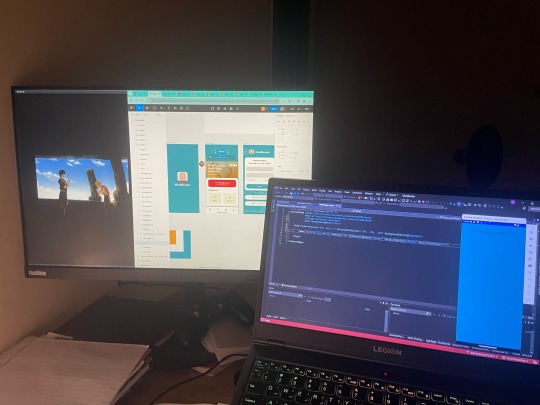#dotnet net
Explore tagged Tumblr posts
Text


Today’s achievement: successfully centred a text!!
Watching: Avatar The Last Airbender.
#codeblr#maui#studyblr#motivation#coding#programming#.net development#.net#.net developers#developer#app development#dotnet#dot net developers
20 notes
·
View notes
Text
The Ultimate Showdown: .NET vs Node.js – Decoding the Battle of Web Developers
🚀 Dive into the ultimate showdown of web development titans: .NET vs Node.js! 🤔💻 Unravel the coding clash as these powerhouses go head-to-head in the quest for supremacy. 🌐💪 Let's decode the battle, weigh the pros and cons, and discover which framework rules the realm of web development! 🔍🔥
#dotnet#nodejs#web development#coding#codingbootcamp#software#.net development#.net developers#node.js#node js developers#node js development company#node js development services#techtalentforce#.netforstartups#nodejsforstartups
2 notes
·
View notes
Link
#ASP.NET Core#C / .NET / dotnet#Software Architecture#Software Engineering#.NET#ASP.NET#C#code#coding#CSharp#DotNet#Programming#Vertical Slice#Vertical Slice Architecture
2 notes
·
View notes
Text
Hire skilled .NET developers in India to build robust, scalable, and efficient applications tailored to your business needs. At Hire in Any Domain, we provide access to experienced professionals proficient in ASP.NET, .NET Core, and C#. Whether you need web development, enterprise solutions, or cloud integration, our developers deliver exceptional results. Affordable, reliable, and dedicated to quality. Call or text (876) 633-4467 or email [email protected] to hire a .NET developer today!
#Hire .Net Developer#Hire .Net Developer in India#Hire .Net Developer India#Hire Offshore .Net Developers#Remote .Net Team#Hire Professional .Net Developers#Hire Affordable Tech Solutions#Hire DotNet Programming Experts#Scalable Tech Solutions#Custom Software Development#DotNet Application Development#Software Development India#Hire from India#Business Tech Solutions#Hire DotNet Solutions India#Hire Dedicated DotNet Developers#Hire Remote Software Experts#Global Tech Outsourcing#Outsource DotNet Developers#Hire in Any Domain
0 notes
Text
0 notes
Text

Hire a .NET Developer for Your Specific Needs at Shaligram Infotech
0 notes
Text
6 Reasons to Hire a .NET Developer for Your Next Project
Choosing the right technology and talent is crucial for success. That’s where .NET developers come into play. By partnering with a skilled dot net development company or opting to hire dot net developers, you ensure efficiency, scalability, and performance in your application development process.
0 notes
Text



Treating myself with a date at my favourite place✨✨
Also why did I miss out on Spanish latte all that long?
#studyblr#study#motivation#langblr#study blog#coding#codeblr#code#women in tech#maui#dot net developers#dotnet#xaml#app development
6 notes
·
View notes
Text
.NET 7 for ASP.NET Developers: Top Features You Need

ASP.NET developers have a lot to look forward to in .NET 7, with enhancements designed to improve web development workflows. In this article, we cover the key updates that ASP.NET developers should be aware of, from minimal APIs to new cloud-native features. Understanding these changes will help you optimize your web applications for performance and scalability. Sign up for dotNetNews today, and stay updated on the latest ASP.NET, .NET 7, C#, and Azure developments.
0 notes
Photo

I'm still learning Blazor, but MAN did this cause me some grief... Have you run into issues with Blazor render mode? In my case, I didn't even know it was breaking my dependency injection AND my event handlers. This was ultimately my error though. I can't blame Blazor for my own misuse! See how I navigated this render mode issue in Blazor and how it impacted dependency injection. Read the article here: https://www.devleader.ca/2024/03/21/blazor-render-mode-how-to-avoid-dependency-injection-woes/ #Blazor #ASPNETCore #DotNet #CSharp
0 notes
Text
Top .NET-Based CMS Platforms: Best Choices for 2024

Discover the top .NET-based CMS platforms for 2024 with Atharva System's comprehensive guide. This article reviews leading CMS options like Umbraco, DotNetNuke, and Sitefinity, highlighting their features, scalability, and customization capabilities. Whether you’re building a corporate website, an e-commerce store, or a content-rich blog, these platforms offer robust solutions for various needs. Dive into detailed comparisons, learn about performance metrics, and find out which CMS best suits your project requirements. Make an informed decision with the latest insights on .NET-based content management systems.
#Asp Net Development Services#Asp Net Application Development#Asp Net Development Company#DotNet CMS#CMS Platforms#Tech Trends 2024
0 notes
Text
Hiring .NET Developers for Startups: Best Practices in the USA, UK, and India

In the fast-paced world of startups, building the right tech team is critical for long-term success. A startup’s ability to scale, pivot, and innovate often rests on the shoulders of a strong development team. When it comes to building web applications, APIs, or enterprise-level software solutions, .NET is one of the most popular frameworks, thanks to its flexibility, security, and scalability.
However, the challenge for most startups isn’t just about choosing the right technology; it’s about hiring the right talent. Whether you’re a startup in the USA, UK, or India, finding the perfect .NET developer can be a daunting task, given the differences in talent availability, cost, and cultural fit across these regions.
In this blog, we’ll dive into the best practices for hiring .NET developers, comparing three major tech markets: the USA, UK, and India. We’ll explore how startups can approach the hiring process, what to look for, and how to navigate the challenges of hiring across these diverse regions.
1. Clearly Define Your Project Requirements
Before you even begin the process of hiring a .NET developer, it’s essential to have a clear understanding of your project’s goals, scope, and specific requirements. Startups, especially in their early stages, often have rapidly evolving needs, which can make it tempting to hire generalists. However, a well-thought-out job description is key to attracting the right talent.
Ask yourself the following questions:
What’s the scope of the project? Is it a simple web application or a large-scale, enterprise-level platform?
What .NET technologies will be used? Will your startup require ASP.NET, .NET Core, or other related frameworks?
Is it a short-term project or a long-term, ongoing need? Depending on the project duration, you might need full-time hires or contractors.
Do you need specific expertise in front-end (UI/UX) or back-end development, or is a full-stack developer required?
Startups in the USA, UK, or India will benefit from taking the time to map out a detailed job description. This ensures you attract candidates with the exact skill sets needed, whether it’s working with microservices, handling cloud-based solutions, or scaling an e-commerce platform.
2. Explore Talent Pools in Each Region
Understanding the talent landscape in each country can help you make a more informed hiring decision. Startups need to weigh the pros and cons of hiring locally, remotely, or outsourcing to different regions. Let’s explore the unique dynamics of hiring .NET developers in the USA, UK, and India.
USA: The USA boasts one of the most advanced technology sectors in the world, especially in hubs like Silicon Valley, Austin, and New York. American .NET developers often have experience working on cutting-edge projects and are highly skilled in modern technologies like cloud computing, machine learning, and DevOps. However, the cost of hiring in the USA is significantly higher than in most other countries. Startups operating on limited budgets may find hiring senior-level .NET developers in the USA a financial strain. One way to mitigate this is by considering remote or freelance developers from outside the country for less critical roles, while keeping key roles such as lead developers in-house.
UK: The UK also has a vibrant tech scene, particularly in cities like London, Manchester, and Birmingham. UK-based developers often have a strong focus on quality, and the tech market is known for its stringent regulations, especially when it comes to data protection (e.g., GDPR). If your startup operates within Europe, hiring a .NET developer from the UK can provide a strategic advantage, as they will be familiar with local regulations and standards. However, like the USA, the cost of hiring in the UK can be high, particularly in London. But the UK also has a rising trend of remote work, allowing startups to hire from other, more affordable regions within Europe.
India: India is one of the top destinations for outsourcing .NET development due to its large talent pool and cost-effectiveness. Indian developers are known for their technical skills and ability to adapt to international business needs. Many startups in the USA and UK have leveraged India’s outsourcing market to build entire development teams at a fraction of the cost. However, there are some challenges, such as time zone differences and potential communication barriers. That said, the growth of remote work culture and the increasing number of developers with international experience have made hiring from India a viable option for many startups.
By understanding the talent pool in each region, startups can make informed decisions on whether to hire locally or remotely, balancing quality, cost, and scalability.
3. Prioritize Cultural Fit and Collaborative Skills
Startups operate in a dynamic, fast-paced environment where teams must work closely together and often wear multiple hats. This makes cultural fit and collaborative skills just as important as technical expertise. A developer might have the right technical qualifications, but if they’re unable to adapt to your startup’s pace and work culture, it could create friction within the team.
Here’s what to consider for each region:
USA: American developers tend to prefer transparent communication and are accustomed to flat organizational structures. They thrive in environments where there’s a lot of collaboration between departments and are used to taking initiative in ambiguous situations. If your startup values open, honest communication and a results-driven culture, developers from the USA might align well with your company’s ethos.
UK: In the UK, there’s often a balance between formal and informal work cultures. Developers may value structured processes and clear hierarchies, especially in more established tech hubs. However, many UK startups and smaller tech firms operate with a more relaxed and flexible environment, which can be ideal for teams that value work-life balance.
India: Indian developers, especially those who have experience working with international teams, are highly adaptable. They are comfortable with remote work, which is crucial if you’re building a global team. It’s essential to establish clear communication channels and ensure regular check-ins, as time zone differences can sometimes lead to delays in feedback or decision-making. Platforms like Slack, Zoom, and Jira can help bridge the gap and foster effective collaboration.
By prioritizing cultural fit, startups can create a cohesive work environment where every team member, no matter where they’re located, feels aligned with the company’s goals.
4. Look for Specialized Skill Sets in .NET Development
While .NET is a robust framework, it’s important to identify the specialized skill sets that your project demands. As a startup, you’ll likely need developers who can wear multiple hats and handle various aspects of development, from coding to testing to deployment.
Consider these key skills when hiring a .NET developer:
Cloud Integration: Many startups are now building cloud-native applications. If your product requires cloud hosting or services like Microsoft Azure or AWS, look for developers with cloud expertise.
API Development: If your product needs to interact with other systems, make sure your developer is proficient in building RESTful APIs using .NET.
Full-Stack Capabilities: Startups benefit greatly from hiring full-stack .NET developers who can handle both front-end (e.g., Angular, React) and back-end development. This allows for greater flexibility and faster iteration in the early stages of product development.
Agile Methodology: Startups thrive on agility, and developers experienced in Agile or Scrum environments will be better equipped to handle the rapid changes and pivots that startups often face.
In the USA, developers with cutting-edge skills (such as cloud computing and full-stack expertise) are widely available but come at a premium cost. The UK offers a more balanced approach, with developers skilled in regulatory compliance and strong full-stack capabilities. In India, many developers are highly specialized in .NET and often have extensive experience working on international projects, making it a cost-effective choice for startups looking for highly skilled talent at lower rates.
5. Budget Realistically Based on Region
For startups, budget constraints are a constant concern, and hiring technical talent is often one of the most significant expenses. The cost of hiring .NET developers varies dramatically depending on the region.
USA: In the USA, a senior .NET developer can command an annual salary ranging from $100,000 to $150,000, depending on location and experience. The cost is even higher in tech hubs like San Francisco or New York. If your startup has a significant budget, you may opt for high-quality U.S.-based developers, especially for roles that require close collaboration with the leadership team. However, for cost-saving purposes, consider hiring mid-level or remote developers from other regions for non-leadership roles.
UK: Salaries for .NET developers in the UK are slightly lower than in the U.S., ranging from £40,000 to £70,000 annually. London-based developers will typically demand higher salaries, but you can find more affordable talent in cities like Manchester or Birmingham. If your startup is looking for a middle ground in terms of cost and quality, hiring from the UK can be a good option, especially if you’re operating within the European market.
India: India offers the most cost-effective solution, with senior developers available for $10,000 to $30,000 annually. This makes India a popular choice for startups that need to build entire development teams on a tight budget. However, it's essential to factor in the cost of managing a remote team, ensuring regular communication, and overcoming any logistical challenges.
Understanding the budget implications for each region can help your startup allocate resources effectively and build a well-rounded .NET development team.
6. Leverage Online Platforms to Find Talent
Finding the right dotnet developers can be challenging, especially for startups that don’t have access to traditional recruitment agencies. Thankfully, several online platforms make it easier to connect with top talent globally.
Here are a few platforms to consider:
LinkedIn: The world’s largest professional network is a great place to find experienced .NET developers. You can use filters to narrow down your search by region (USA, UK, or India), skills, and experience.
Upwork: This freelance marketplace allows you to find remote .NET developers for both short-term and long-term projects. It’s ideal for startups looking for contract-based developers or those who want to test the waters with remote work before committing to full-time hires.
Toptal: Known for connecting startups with the top 3% of freelance developers, Toptal is a premium platform for hiring vetted .NET talent. While more expensive than platforms like Upwork, it guarantees high-quality candidates.
AngelList: A platform specifically designed for startups, AngelList allows you to post job openings and connect with developers who are interested in working in a startup environment.
By using these platforms, startups can tap into a global talent pool, allowing for more flexibility in terms of budget and skills.
7. Vet Candidates Thoroughly
Vetting is arguably the most crucial step in hiring a .NET developer, especially for startups where every team member’s contribution directly impacts the company’s success. Whether you’re hiring in the USA, UK, or India, a thorough vetting process ensures you hire the best candidate.
Here’s a checklist for vetting:
Technical Interviews: Conduct in-depth technical interviews to assess the candidate’s knowledge of .NET and related technologies. Use coding challenges or pair programming sessions to evaluate their problem-solving skills in real-time.
Portfolio Review: Ask candidates to share their past projects and explain their role. This will give you insight into their experience and the kind of work they excel at.
Cultural Fit: Beyond technical skills, assess the candidate’s soft skills. Are they a team player? Do they have strong communication skills? Will they thrive in a fast-paced startup environment?
References: Always check references from previous employers or clients, especially for remote hires. This helps you gauge the candidate’s reliability, work ethic, and overall fit for your startup.
Platforms like Codility and HackerRank can also be useful for conducting coding tests and screening technical candidates before moving them to the interview stage.
Conclusion
Hiring .NET developers for your startup can be a challenging but rewarding process. Whether you’re looking to hire locally in the USA or UK or outsource to India, the key is to clearly define your project’s needs, set realistic budgets, and prioritize both technical skills and cultural fit.
The USA offers top-tier talent but at a higher cost, making it suitable for key roles that require close collaboration with the leadership team. The UK provides a balance between quality and cost, while India offers a vast pool of highly skilled developers at a fraction of the price, ideal for startups with tight budgets.
By following these best practices and leveraging the global talent pool, you’ll be well on your way to building a strong .NET development team that will help your startup thrive.
This longer version delves deeper into each aspect of hiring .NET developers across these three regions and provides practical insights for startups.
0 notes
Text
0 notes
Text

Struggling with onboarding top-tier .NET developers in your team? 🤔 Look no further! ✨
Our comprehensive blog helps you hire talented .NET developers to build scalable, high-performing, and robust .NET applications that not only meet your users’ expectations but exceed them! 🤩🔥
Read the full blog and level up your .NET game with Magicminds! 🚀👉 https://bit.ly/3X1ET34
#dotnet#.net development#hire .net developers#hiring .net developers#software development#app development
0 notes